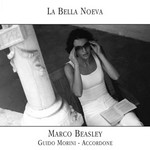
La Bella Noeva
 $40.00
Out of Stock
$40.00
Out of Stock6+ weeks add to cart
STEFANI / MONTEVERDI / CACCINI / ANONIMO / MORINI
La Bella Noeva
Marco Beasley (voice) / Accordone
[ Alpha / CD ]
Release Date: Thursday 2 March 2006
This item is currently out of stock. It may take 6 or more weeks to obtain from when you place your order as this is a specialist product.
In the 17th and 18th Centuries music circulated in Europe in the form of manuscript arrangements of popular works. Marco Beasley and Accordone have proposed to revive this quotidian practice of the epoch.
Tenor Marco Beasley's previous contributions in L'Arpeggiata's La Tarantella (type Q7699 in Search Reviews) were impressive. As the lone vocal soloist in this program titled La Bella Noeva (The Good One) Beasley (accompanied by the period-instrument ensemble Accordone) again delivers cogent, spirited performances of primarily late-Renaissance works. Unlike in the more limited repertoire of La Tarantella, La Bella Noeva's more varied and diverse subject matter allows Beasley an even greater opportunity to display his range and versatility.
Giuilio Caccini's two love songs, O mia donna amata and E' il canto del cuore, form a nice back-to-back comparison, showing Beasley's ability to evoke the different moods of each work. His broader gestures in the former are quieter and more lamentation-like compared to the livelier celebratory nature of the latter. Yet, this telling contrast hardly prepares us for the fun Beasley and his colleagues engage in as the program continues.
For example, Beasley's own composition Racconta per ore (It tells for hours) is a highly spirited Tarentella that today sounds as stylistically fitting as if it had been written 500 years ago. Here Beasley's numerous cries for help, his ongoing hallucinogenic descriptions, and his declarations of impending insanity are delivered with a repetitive fluency bordering on "rap". The instrumental accompaniment (guided by baroque guitarist Stefano Rocco and Guido Morini on harpsichord) effectively augments the work's rhythmic momentum.
Beasley really shines in the program's longest work--an anonymously composed, two-part short story disguised as a song, Se defenisce che cos'e Ammore... (Definition of Love...)/Di guerre d'amore (Love's battles). Here Beasley's excellent diction and expressive agility are stunning as he assumes various character roles that often are sung at reckless speed. His falsetto (especially during the Sardine's aria) and lower-octave growl used to personify old Mother Blenny are particularly hilarious.
Alpha's engineering is generally fine, though unlike many of the label's previous offerings where the sound was more convincingly balanced, at times the instrumentalists seem unnaturally attenuated in the mix. Franco Pavan's informative notes include many entertaining anecdotes. All fans of Italian song--no matter what period--surely will delight in this inspired recital.
--John Greene
Tracks:
1 Amante felice, (Giovanni Stefani) (2'52)
2 Sì dolce è 'l tormento, (Claudio Monteverdi) (3'26)
3 Tu ch'hai le penne, Amore, (Giulio Caccini) (4'44)
4 Amarilli, (Giulio Caccini) (4'33)
5 Udite amanti, (Giulio Caccini) (4'25)
6 Amante lontano dalla sua donna, (Biagio Marini) (3'01)
7 Tarantella Primma, siconna e terza, (Marco Beasley) (4'24)
8 La bella noeva, (Anonimo) (5'08)
9 La canzone del Guarracino, (Anonimo) (6'48)
10 O quam tu pulchra es, (Alessandro Grandi) (3'54)
11 Concerto spirituale, (Guido Morini) (4'22)
12 Laudate Dominum, (fragment), (Monteverdi) (3'47)
13 Alleluja: omnis spiritus laudet Dominum, (Accordone) (2'57)